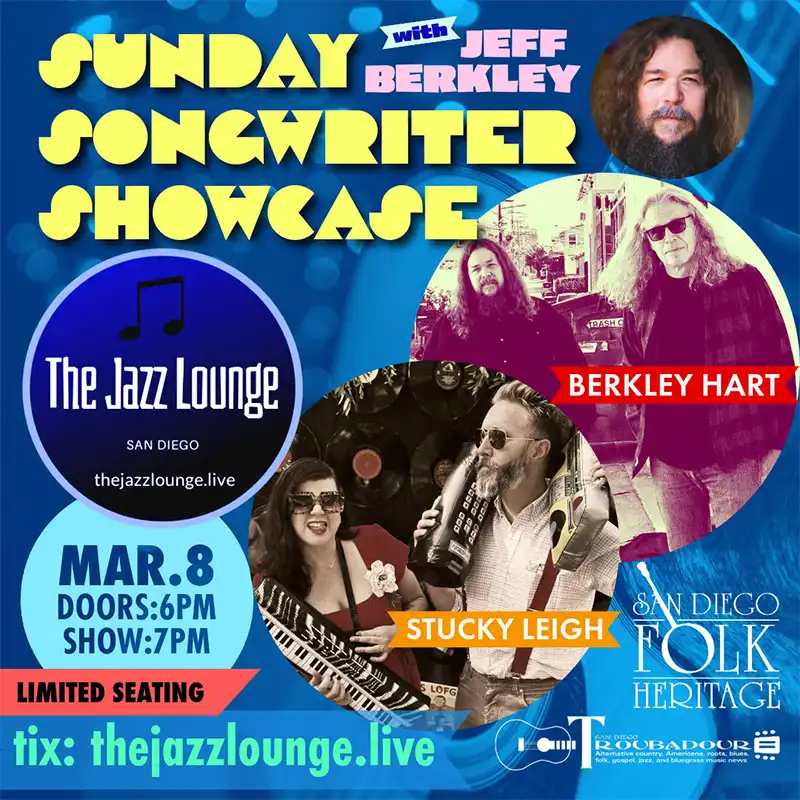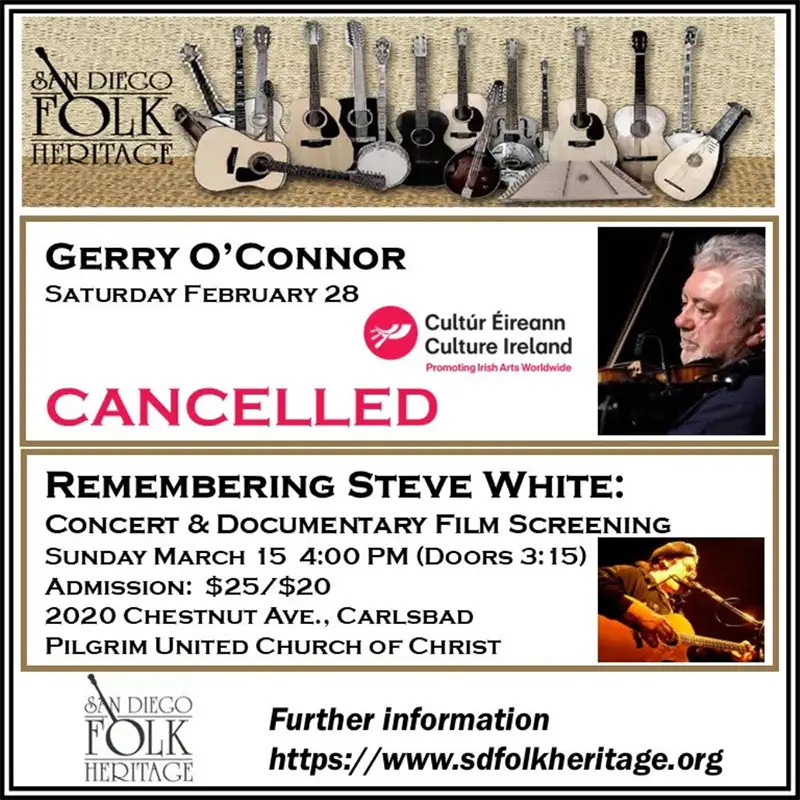Yesterday And Today
Tim Dismang and the JOHN STEWART Band Pay Tribute to a Legend
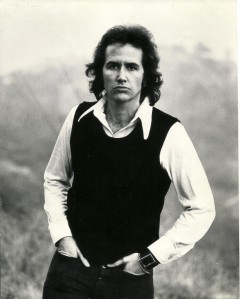
John Stewart (1939-2008)
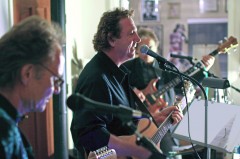
Tim Dismang and the John Stewart Band
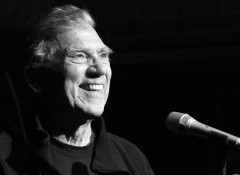
Jimmy Duke
When San Diego native, legendary singer-songwriter, and member of the Kingston Trio, John Stewart died in 2008, he left behind a legion of loyal fans, friends, and family. He also left countless stories of the personal impact he had on people’s lives. He was not just any singer-songwriter but a pioneer in what we call Americana today. He paved the way with a distinctly hybrid fusion of country, folk, and rock two decades before the term was even dreamed up. It is clear, after listening to his debut solo album, California Bloodlines, released 45 years ago this year, that he is a pivotal figure in founding and defining Americana music.
This month, two important people in the John Stewart story, who were both touched by Stewart and who touched him as well, will stage a special tribute show that will include core members of John Stewart’s band.
Jimmy Duke, who has hosted house concerts at his home in Lakeside near San Diego since 1998, will produce a tribute show as a part of his Dark Thirty house concerts on October 11. The series name comes from the summer to early fall start-up time for the shows that begin 30 minutes after sunset. Other artists who have performed in the series include Chris Smither, Eliza Gilkyson, Shana Morrison, Michael Peter Smith, Leo Kottke, and the Hot Club of Cowtown.
While there are many people who talk about meeting John Stewart as he traveled internationally and played a variety of venues over five decades of performing, Jimmy Duke’s story boasts giving Stewart a performance home in the San Diego area at a time when his usual venues in the area had closed down.
“Around 2000 I contacted John’s booking agent whose name I got through Ron Beffa who has a website dedicated to John called Clack’s Cellar. When they asked John if he wanted to play a house concert he said yes!” Duke said. “At first he was kind of standoffish about playing a house concert. He said he thought he’d be sitting on a couch and strumming guitar while everyone sat on the floor with pillows.” Duke laughed
Jimmy Duke wisely decided to hire a limo to pick up Stewart for his first show at Dark Thirty Productions where he was staying at the San Diego home of his good friend and Kingston Trio bandmate, Nick Reynolds. That was the beginning of a beautiful relationship. When asked if he would return to the house concert to perform again Stewart said he would book there two times a year. From 2000 to 2007 Stewart played nine shows for the series. “From that time on I always had the limo pick John up for the shows.” Jimmy Duke then added, “I loved that man, and some thought he loved me back.”
Leading the tribute to John Stewart this month will be Tim Dismang whose uncanny ability to call up the essence of Stewart in performance is something to behold. However, he is not an imitator in the Elvis sense. His ability to embrace and project Stewart in song comes from a lifelong love and admiration for the man as an artist and as a performer.
Although Dismang, who grew up in San Juan Capistrano, was familiar with Stewart through his father’s love for the Kingston Trio, it was seeing him live at the Four Muses in San Clemente, established by Jim and Mary Jenkins, in 1971, that Stewart’s artistry first struck Dismang. “I had never heard anything like it.” He said. “His songs expressed all parts of life. He was so authentic. It was expressions of spirit, something that is inside of us all that yearns to be
spoken.”
As Dismang began to learn and perform his favorite songs, people would tell him he sounded like John Stewart. ”I could only say, that’s what’s inside of me. I was never trying to sound like John,” Dismang said.
However, he had one fan who demanded his attention. At the encouragement of Stewart’s bass player, Dave Batti, Dismang went to his first Trio Fantasy Camp in 2003. The camp was founded by John and Buffy Stewart to allow fans and friends to come together for a week in Scottsdale, Arizona, to rehearse and play with surviving members of the Kingston Trio, including Stewart, Nick Reynolds, and Bob Shane. As a rule, most participants worked on performing Kingston Trio songs. However, Dismang, who was more of a John Stewart fan, asked Stewart if he could perform one of his solo songs. After some initial reluctance he agreed. “John told me, ‘do what you want, Tim.’ So, I did ‘Dreamers on the Rise.’” The song, which is about the days John and Buffy Stewart spent campaigning for Robert F. Kennedy’s 1968 presidential campaign, is one of his most poignant and popular songs among John Stewart fans. When Tim Dismang performed the song in front of the Trio Fantasy Camp, the audience fell silent. As he finished, Stewart joined him on stage and whispered in his ear,”You son-of-a-bitch! You nailed it!” He then announced to the crowd, “This is the first guy I’ve heard who can sing my songs the right way!”
Thus began a friendship that lasted for nearly five years. “I couldn’t believe it. Here I was having dinner with John Stewart!” Dismang said. “I was hanging out with him!” Not long after Dismang would introduce Stewart to his friend of 30 years, lead guitar virtuoso, Bob Hawkins, who would be drafted into the John Stewart Band. Hawkins will be joined by Dave Batti on bass and Dennis Kenmore on drums for the Dark Thirty Productions tribute show.
As Dismang sees it, much of what has unfolded over the years has been like one of John Stewart’s classic songs from 1987’s album Punch the Big Guy. “That song ‘Strange Rivers,’ where John sings about the choices we make and how our lives change as a result. We’re all connected by this spirit that was a part of John and really a part of us all. I feel like I’m living out those strange rivers”
As our conversation drew to a close, Dismang remembered one of John Stewart’s most important and beloved songs, “Mother Country.” “You know, for me it was about I do love you. Mother Country.” Dismang explained. “So much of what has gone wrong in the world is because we’ve lost sight of the essence of ‘I do love you’ in our lives. What is left when all is said and done is ‘I Do Love You.’ Love is at the core, beyond everything else. John showed me this through that song. The spirit is not effected by all this stuff.”
When “Mother Country” was first released in May of 1969, it opened side two of Stewart’s first solo album, the groundbreaking California Bloodlines. It was an album that foreshadowed the singer-songwriter movement of the early ’70s. Before there was Sweet Baby James by James Taylor and Tapestry by Carole King there was John Stewart’s California Bloodlines. And at its center was “Mother Country.” What had come before on the first side of the album was irony enough for the times.
This was a time in our history when America was engaged in the undeclared Vietnam War, when campus protests and unrest were commonplace. Racism and bigotry was raising its ugly head, giving many people reason enough to feel bitter toward America. Even the artist widely regarded as a spokesperson for the generation, Bob Dylan, had withdrawn into the gentle, sweet, and mostly forgettable country music of Nashville Skyline as a shelter from the turmoil of the times.
In a poignant twist of history, John Stewart, with the help of legendary L.A. producer Nick Venet, went to Nashville and hired the same musicians Dylan used for his Skyline sessions, to record live in studio the freshly conceived tracks for California Bloodlines. That in itself was a bold move. But, rather than recording an album of patriotic disillusionment and protest, Stewart and Venet gave birth to an album that affirmed the essence of the American experience in a way that was much deeper than mere politically driven patriotism or discontent. Rather, in a way similar to Music from Big Pink and The Band from 1968, California Bloodlines embodied the hope for the future of the country with portraits of the everyday struggles of ordinary Americans. It was his lyrical, picturesque homage to the people he met in every city of every state as he campaigned for Robert Kennedy. According to Buffy Ford Stewart, “John was singing about those people he saw. It really changed him as a person and a writer.”
“Mother Country” chiming in at the half-way mark of the 12-song collection takes us to the album’s highest peak with a song of stories about the good old days of the century divide, the Johnstown Flood and the stone-blind horse owner E.A. Stuart and his champion, the Old Campaigner who he called “Sweetheart on Parade.” And it all crescendos with the chorus-refrain “Oh Mother Country, I Do Love You.” It was an America unfamiliar to the counter-culture rebellion of its day in 1969. This was not the America that hated minorities and slaughtered Easy Riders. It was the America of Steinbeck and Andrew Wyeth. John Stewart’s vision was that of a true patriot — a love of country that rose up from the stories born from the people of the dream, as he called it. They were the insiders, the dreamers and the survivors, the ones who “did the best they could,” as he sang said in “Mother Country.” They were the ones from whom John Stewart drew his vision for his songs, which would reëmerge over the course of a recording career that would last for the next four decades. They are the Jimmy Dukes and Tim Dismang whom John Stewart would later befriend and influence toward the dream and the reality of American music at its finest.
This is the “I Do Love You” that Tim Dismang speaks of with such clarity and passion. It is connected to the life and legacy of John Stewart, one of America’s most important songwriting voices of the last 100 years. It is this essence that Tim Dismang naturally and without effort portrays in song because at the root of it all is that love he refers to and the very same love that burned like a great fire inside of Stewart. The fire still burns. His wife, Buffy Stewart, is the keeper of the flame. Tim Dismang, Jimmy Duke, and all of us who have loved Stewart’s life and music, fan that flame each time we remember and tell our stories and sing these wonderful songs. The flame burns stronger when we remember. I do love you. That says it all.
Tim Dismang and the John Stewart Band will pay tribute to John Stewart on Saturday, October 11, 7:30pm. Jimmy Duke’s house concerts in Lakeside. Reservations: 619.443.9622





